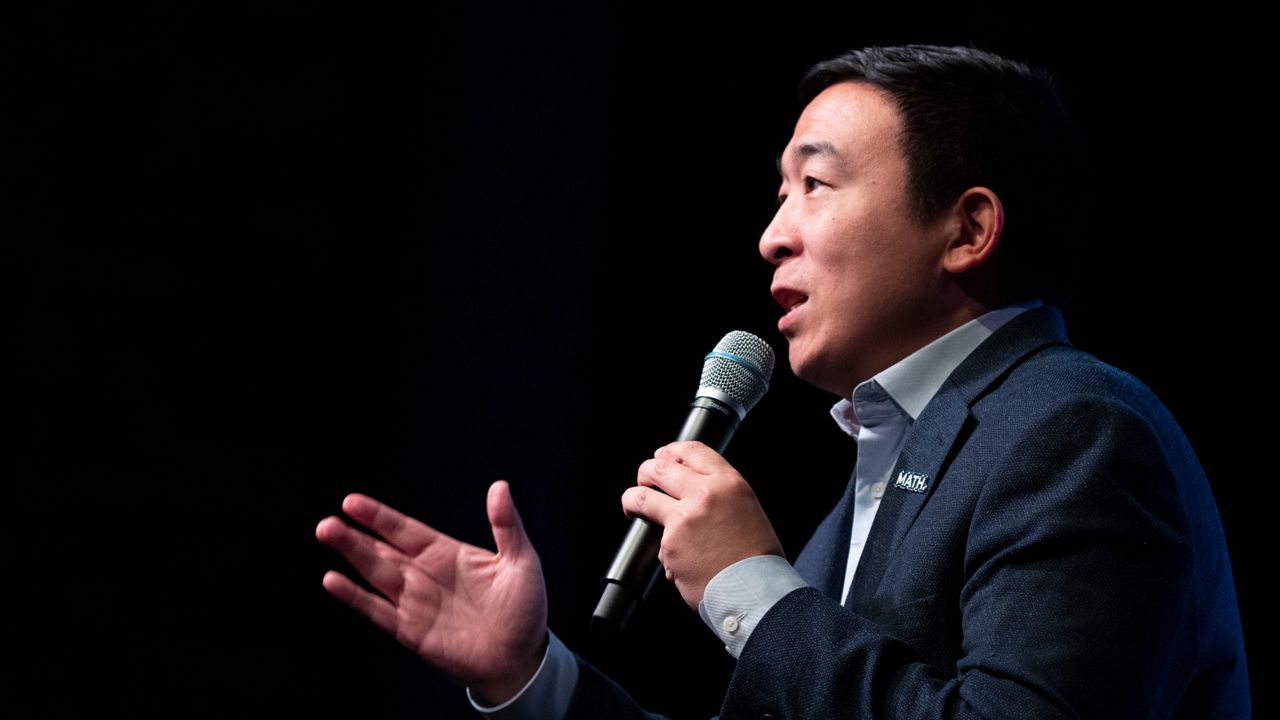NEW YORK — After weeks of weighing a candidacy, former presidential candidate Andrew Yang announced on Wednesday night that he is entering the race for mayor.
Yang’s campaign released a video showing him in iconic locations across the five boroughs. He plays the piano near the Coney Island boardwalk, rides the subway near Yankee Stadium, watches a skateboarder, and then takes a spin on it at Grand Army Plaza, and walks across the Brooklyn Bridge alongside his wife, Evelyn.
"I ran for president because I saw the economy was not working for everyday Americans," Yang says in the video. "Seeing my city the way it is now, breaks my heart."
Yang has never held public office but he brings considerable name recognition and a loyal online following to a race that will determine who will run America's biggest city during a time of deep financial crisis and instability in the wake of the Coronavirus pandemic.
During the race for president, Yang became best known for his universal basic income proposal to give every American $1,000 a month and his campaign against automation, which he described as a growing threat to the U.S. economy.
In the video, Yang says he will propose a similar plan for New Yorkers -- an idea which could shake up the race and set him apart from left-leaning, progressive candidates who have been courting the city's liberal voting bloc.
"We need to realize Martin Luther King Jr.'s dream of a guaranteed minimum income and get cash into the hands of people who need it most," Yang says.
Yang's video announcement is expected to be followed with an in-person launch this week. His platform will include a plan to increase internet access, take local control of the city's subway system and the creation of a "people's bank" meant to increase financial opportunity for low income New Yorkers.
Yang is joining a crowded field of candidates all vying to become the Democratic nominee ahead of the June primary. Yang lives in Manhattan with his wife and two children, attended Columbia Law School, and formerly headed a test preparation company called Manhattan Prep. He spent part of his boyhood in Westchester County and his family now keeps a home in New Paltz in Ulster County in the Hudson Valley.
Already he's facing scrutiny from his opponents, most recently after comments Yang made in an interview with The New York Times this week, describing the difficulty of working from home and parenting during the pandemic.
“We live in a two-bedroom apartment in Manhattan. And so, like, can you imagine trying to have two kids on virtual school in a two-bedroom apartment, and then trying to do work yourself?" Yang told the Times, describing his family's decision to move to their second home in New Paltz.
That comment drew the rebuke of several candidates who suggested Yang's comments showed he is out of touch with how many New Yorkers live and the struggles many of them have faced during the last nine months.
The campaign video seemed to make a concerted effort to validate Yang's New Yorker credentials.
"I grew up an hour north and came into the city whenever I could. In 1996 I moved to Morningside Heights," Yang says. "I came of age, fell in love and became a father here, my wife Evelyn is from Queens. Both my sons were born at St. Luke's."
In recent days, Yang has had to explain his decision to leave the city during the most difficult months of the pandemic. He has also been criticized for his spotty municipal voting record which shows he has never cast a ballot in several races for mayor in recent years.
Barely in the race but already on the defensive, the last few days show what is likely to be one of the biggest challenges in his campaign: Yang is untested in the New York City political field and he will need to capture the support of key constituencies, including Black New Yorkers and labor groups in order to move ahead.
To that end, there are two notable cameo appearances in the campaign video: Yang is seen dining with State Assemblyman Ron Kim -- a Democrat who represent parts of Whitestone and Flushing and could be seen as influential in the Asian community. During the appearance Kim talks about the plight of small business owners. Yang also appears alongside Bronx Congressman Ritchie Torres as the pair stand in the courtyard of a public housing complex while Torres praises Yang's universal basic income proposal.
A spokesperson for the campaign said the appearances by Kim and Torres are not official endorsements.
In the uphill climb he's likely to face between now and the June primary, Yang will have to convince voters he can help lead the city through deep economic instability, command a municipal workforce more than 300,000 strong, balance a $90 billion dollar budget and deep deficits created by the pandemic.
Yang's candidacy will also test whether New York city voters are more interested in an outsider candidate that can bring new and untested ideas to City Hall or a more experienced hand with better knowledge of municipal government and a network of support in different communities.



